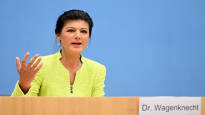“The current German government is perhaps the worst in history,” popular far-left MP Sahra Wagenknecht said in Berlin on Monday.
BERLIN A popular left-wing populist member of parliament Sahra Wagenknecht creates a new party in Germany that has a real chance to shake up the country’s political field.
The party will start at the beginning of next year. It is being built by an association during the autumn, whose leading figures, like Wagenknecht, are largely defectors from the left-wing party Die Linke.
The name of the association says the essential: Sahra Wagenknecht’s association. Wagenknecht is the star of Germany’s far left, whose popularity has only grown as Die Linke’s popularity has weakened. His name is so catchy that you can build an entire party on it.
The party plans to nominate candidates for both state elections and European elections next year. The purpose is change the German political field and offer voters frustrated with both the left and the right a new channel of influence.
Wagenknecht made it clear at the press conference that the main purpose is to challenge the policies of the current government consisting of Democrats, Greens and Liberals.
– The current government is the worst that the United Federal Republic has had, Wagenknecht told a full press room in Berlin on Monday.
A mix of right and left
Wagenknecht is one of Germany’s most controversial politicians. Until now, he has led the hard-left Die Linke, born from the Communist Party of East Germany.
Wagenknecht is a gifted speaker and bestselling author. According to opinion polls, every fourth German could consider voting for the party he leads.
When it comes to economic issues, Wagenknecht challenges left-wing parties who, in his opinion, do not pay enough attention to the issues of German companies.
He is close to the extreme right when it comes to immigration issues or gender diversity issues. With these, he can fish for votes from the Alternative for Germany party, or AfD, which has been on the rise recently.
Wagenknecht has questioned Germany’s “open door” immigration policy in 2015-2016 and strongly opposes German arms deliveries to Ukraine, just like the AfD.
However, at a press conference on Monday, he resigned from cooperation with the AfD, like other German parties.
– I have been called “Putin” and pro-Russia in the media and told that I would support a GDR-type state-led economic system. That’s not true.
In Wagenknecht’s opinion, Germany should simply stay out of conflicts and act as a mediator in them.
